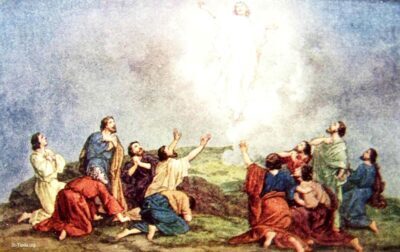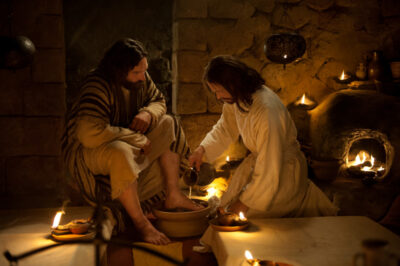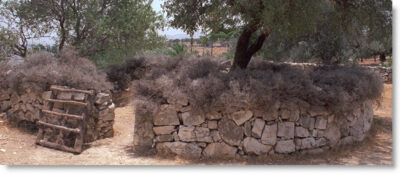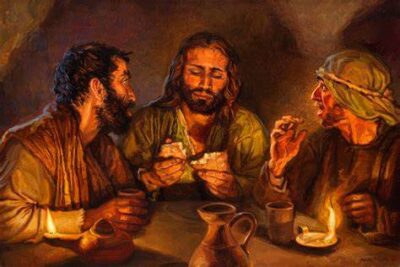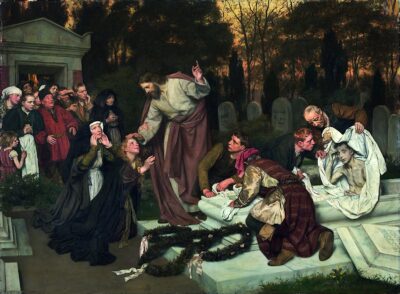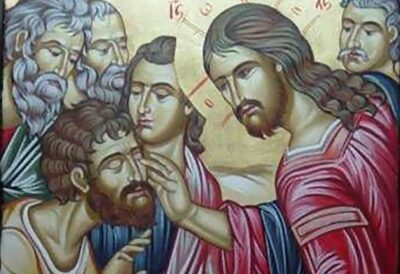March 26, 2023
|by N W
|
0 Comments
|
Deacon Mark, Faith, Healing, Resurrection, Saints, Trust, Uncategorized
Fifth Sunday of Lent
March 26, 2023 — Year A
Readings: Ex 37:12-14 / Ps 130 / Rom 8:8-11 / Jn 11:1-45
by Rev. Mr. Mark De La Hunt, Permanent Deacon
From today’s Psalm we hear, “I trust in the Lord; my soul trusts in His word (Ps 130: 5-6).” It is a good Lenten practice to ask ourselves, Do I trust God? Do I understand what is meant by divine providence? When my future is uncertain or I am experiencing suffering, darkness, death, or discord in my life, do I trust that He hears and answers my prayers? Today’s gospel clearly affirms that in God’s plan, “[S]uffering and death are not meaningless (Martin 200).”
On Hallow’s forty-day Lenten series, Jonathan Roumie shared a story that illustrates how God, in His providence makes good come from suffering. Fr. Walter Ciszek, a Polish-American Jesuit priest who was doing clandestine missionary work in the USSR, was imprisoned in a Soviet Union labor camp for twenty-three years. While in prison, he struggled with the seeming crushing of his dream to spread the faith. Despair came upon him, until he surrendered to God in the midst of his imprisonment, forced labor, and nutritional and spiritual deprivation.
How did Fr. Ciszek’s Catholic faith enable him to move from despair to helping the other prisoners “find God and attain eternal life (Hallow)?” A key insight was that he came to realize that “God is in all things.” He wrote, “To see His will in all things was to accept each circumstance and situation and let oneself be borne along in perfect confidence and trust. No danger could threaten me, no fear could shake me, except the fear of losing sight of Him. The future, hidden as it was, was hidden in His will and therefore acceptable to me no matter what it might bring.” This quote is from his autobiography, “He Leadeth Me,” which he wrote in peace and comfort in America. His autobiography is accomplishing his dream of spreading the faith much more effectively than if he had not suffered as he did.
Now let’s look at the gospel for a message on trust in divine providence. When Jesus receives word from Mary and Martha that Lazarus is ill, does He go and heal him as Mary and Martha expected their intercession to bring about? No. Listen to the oddness in these two verses. “Now Jesus loved Martha and her sister and Lazarus. So, when He heard that he was ill, He remained for two days in the place where He was (Jn 11:5-6).” Jesus, who is God, loves them and hears their prayer request to heal Lazarus, but does not do it. Why?
Jesus gives us a couple of reasons. After telling the disciples that Lazarus has died, He says, “I am glad for you that I was not there, that you may believe (Jn 11:15).” At Lazarus’s tomb, He tells His Father that He is praying out loud “that they may believe that you sent me (Jn 11:42).” Jesus delayed so that people would come to believe He was sent by God and has power even over the grave.
Dr. Brant Pitre shares the reflections of three saints on Jesus’ delay. They shine a light on divine providence that Mary and Martha, in the sorrow of the moment, could not see. St. Peter Chrysologus explained it this way: “For Christ, it was more important to conquer death than to cure disease. He showed His friend His love not by healing him but by calling him back from the grave. Instead of a remedy for his illness, He offered him the glory of rising from the dead (Sermon 63:1-2).”
My favorite of the three reflections Pitre shared may be from St. Andrew of Crete. He imagined Jesus at Lazarus’s tomb saying, “Lazarus, Come out!…As a friend, I am calling you; as Lord I am commanding you…Come out! Let the stench of your body prove the resurrection. Let the burial linen be undone so that they can recognize the one who was put in the tomb. Come out!…Come out of the tomb….(And here is the clincher….) Teach them how all creation will be enlivened in a moment, when the trumpet’s voice proclaims the resurrection of the dead (Homily 8).” St. Andrew was alluding to 1 Thessalonians 4:16, which tells of an angel blowing a trumpet when Jesus returns on the last day and the dead being raised at its sound. This spiritual truth is sung at the Easter Vigil in the Exultet, “Let the trumpet of salvation sound aloud the mighty King’s triumph!”
The third reflection was from St. John Chrysostom. He points out that, “Many are offended when they see any who are pleasing to God suffering anything terrible…They do not know that those who are especially dear to God have it as their lot to endure such things as is the case with Lazarus, who is a friend of Christ but was also sick (Homilies on John).”
God knows the big picture. We do not. Mary and Martha did not. While they just wanted their brother healed, Jesus wanted to draw more people to Himself by showing that He has power even over death. Through divine providence, Mary and Martha received a gift much greater than what they asked for.
The saints seem to get this, and so they do not fret over their suffering or impending death. St. Pope John Paul II, St. Therese of Lisieux, St. Gianna Beretta Molla, and the aforementioned St. John Chrysostom come to mind (Pitre). They could live lives of heroic virtue because they trusted that God’s providence would bring about a greater good out of their suffering and death.
In raising Lazarus from the dead, we see Jesus vastly exceed that for which Mary and Martha prayed. This teaches us to trust that God hears our prayers and sees our tears (remember He wept with them). We have been doing extra fasting, abstinence, prayer, and charity for five weeks, but do we trust that God is doing something with our efforts? If you have not noticed any change or transformation in yourself, it may be that like Mary and Martha you are focused on looking for what you asked for instead of looking for what God chose to do. Ask Jesus, through the Holy Spirit, to reveal what the Father has done and is doing in you.
Here is another true story about providence, and this one is from a friend of mine named HV. He was a 16-year-old when his family had to flee their home country of Vietnam. HV remembers suffocating heat worsened by standing shoulder to shoulder on a boat with other refugees. People began to die around him as they had no water for three days. Ultimately, his family arrived in Virginia Beach. HV had no friends, could not speak English, and struggled with American culture.
Growing up, HV’s parents had prayed the rosary regularly with him and his siblings. His father had even taken him to a seminary to apply for the priesthood. (He was turned down.) Nevertheless, the awfulness of his family’s refugee experience led him to decide that God did not exist. Like Fr. Ciszek, though, HV came to see God in all these things.
His family survived the boat trip and were now living, in HV’s words, “in the greatest country on earth.” He ended up marrying, having children and becoming an engineering manager. He and his wife served the youth in their parish, and he served in the Knights of Columbus. And on September 25, 2021, the man who was turned down by that Vietnamese seminary, was ordained with me and is now a permanent deacon. And, by the way, his easy-going manner and sense of humor made him the class favorite and enviably, my family’s favorite as well. His parent’s prayers were heard, and God made a greater good come about for his family from the evil of war than if it had never happened.
My last sharing is from the Litany of Trust by Sr. Faustina Maria Pia of the Sisters of Life in New York. It was prayed in Hallow’s 40 Day Lenten challenge. She wrote that, “The Lord knows that we don’t have what it takes on our own. He comes to us with great love. He sustains us at all times, even when we are not aware of Him.”
Let’s close with part of the Litany so that you can continue to pray your own form of it these last days of Lent. I invite you to respond in your heart after each petition, Jesus, I trust in You. “That You are with me in my suffering…Jesus, I trust in You. That Your plan is better than anything else…Jesus, I trust in You. That You always hear me, and in Your goodness always respond to me…Jesus, I trust in You. That you give me all the strength I need for what is asked…Jesus I trust in You. That you can deliver me from resentment [and] excessive preoccupation with the past…Jesus, I trust in You. That my life is a gift…Jesus, I trust in You. That I am Your beloved one…Jesus, I trust in You.”
Brothers and sisters, make the saints’ trust in divine providence yours and, with God’s grace, move your Lent from doubt to confidence and from struggle to peacefulness. God is in all our experiences and so our future, no matter what it holds, is the best. Amen.
Citations
Hallow App. Lent #Pray40 Part 1: Imitation of Christ. Week 5 Tuesday and Wednesday reflections. March 2023.
Peter Kreeft. Food for the Soul – Reflections on the Mass Readings for Cycle A. Word of Fire 2022.
Fr. Mark Toups. Lenten Companion, A Personal Encounter with the Power of the Gospel. Ascension Publishing 2023.
Fr. Francis Martin & William T. Wright IV. Catholic Commentary of Sacred Scripture. The Gospel of John. Baker Academic, 2015.
KEEP READING
 540-586-8988
540-586-8988 

